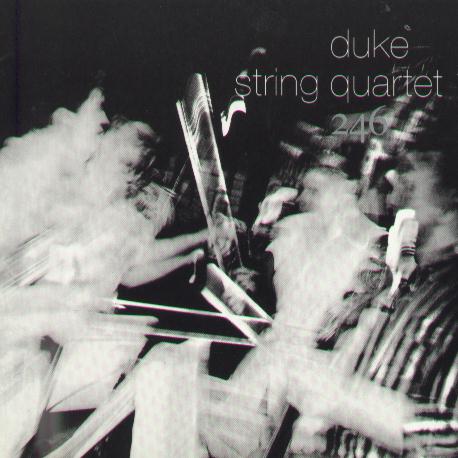Factory Classical > FACD 246 Duke String Quartet

FACD 246 Duke String Quartet; front cover detail
Title: Duke String Quartet ('246')
Release date: September 1989
Format
LP: (Factory Fact 246)
CS: (Factory Factc 246)
CD: (Factory FACD 246)
DAT: (Factory Fact 246d) *
Tracklisting
Dimitri Shostakovich - String Quartet No. 8, Opus 110
Largo [4:40]
Allegro Molto [2:41]
Allegretto [3:56}
Largo [5:27]
Largo [3:39]
Michael Tippett - String Quartet No.3
Grave e Sostenuto - Allegro Moderato [8:08]
Andante [6:39]
Allegro Molto e con Brio [3:33]
Allegro Comodo [4:06]
Mastering
~ FAC-246-A-1, Townhouse D.M.M., LYN-23347, A
~ FAC-246-B-1, Townhouse D.M.M., LYN-23348, A
CD ~ FACD 246. Mastered By Nimbus
Credits
Digitally recorded at Finemere House
Buckinghamshire by Nick Robins
Produced by Paul Smith and the Quartet.
Edited by the Quartet and Adam Skeaping.
Project co-ordinator: John Metcalfe.
Distributed by Pinnacle Records for the UK
Dureco for the Benelux Rough Trade Deutschland for
West Germany and Polygram for Canada.
Cover photography: Robert Shackleton.
Photographic art direciton: Mark Farrow for 3A.
Design: Peter Saville Associates, London.
A Factory Classical Compact Disc.
©1989 Factory Communication Ltd.
Manchester, England.
Sleevenotes by Steve Martland
Of his eighth quartet written in 1963, the great Russion composer Dimitri Shostakovitch has said, 'It happened like this-I went to Dresden, where our Mosfilm group happened to be at the time, making a film called The Five Days and Nights about the rescuing of the treasures in the Dresden Gallary, And Dresden made a terrific impression on me with the frightful and senseless destruction. Dresden had been savagely bombed when it was obvious who was going to win the war. This devastated city remined me of our own devastated cities that I'd been in, and of the human victims, the many lives taken away by the war that Hitler's fascism unleashed. All this made sucdh a profound impression on me that in three days I had the quartet completely finished.
Taken at face value, there is no reason to doubt genuine feelings. However, all is not as it seems. The recent publication in the West of the composer's memiors testimony (edited by Solomon Volkov) has changed our perspective of Shostakovich, his music, and in particular, his relationship with official Soviet culteral policy. It is clear, especially in relation to the Eighth Quartet, that Shostakovich's 'official' and hence acceptable, statements are nothing but deceptions--shrewd cover-stories invented to mask feeling which are more directly related to the composers own experiences during the cataclysm of the Stalin era.
Joseph Stalin told Winston Churchill that, 'Ten million Kulaks had been dealt with during collectivisation', most of them, 'wiped out'. In fact the total mortality figure for the Stalin years 1930 to 1953 is estimated at a staggering and horrifying 20 million human beings. That Shostavkovitch himself suffered tragically is evident in his music which is sort of musical documentary of, and for, its times. The Eleventh Symphony for instance, written in 1957, is concerned, like the Eighth Quartet, with other events than those disclosed in the offical programme. In the case of the symphony the external event happens to be the 1905 Revolution, but in Testomony Shostakovitch declares, 'It's about the people who have stopped believing because the cup of evil has run over'. Afraid of persecution and therefore unable to say what he truly felt, Shostakovitch confided his secret messages in his music. In the Eighth Quartet he achieved this in a musical code--namely profuse self-quatation--\which his public would understand but the cultural bureaucracy not.
In Particular is the obsessive repetition of Shostakovitch himself in the form of the musical notes DSCH. The letters from the German transliteration of the composer's name, D(mitri) and SCH(ostakovitch), form the musical notes D, Eb, C and B, and this motto haunts the entire quartet. Shostakovitch puts himself at the centre of the catastrophe that was the Russian experience of totalitarianism under Stalin.
The horrific killing of a small boy by the Cossack during street riots in Leningrad was Shostakovitch's earliest experience of inhumanity. He remarked in later life, 'I didn't forget that boy and I never will'.
Shostakovitch's music was written so that future generations might know the truth. The Eighth Quartet is music of savagery and desolation; of struggle and despair; of hope and suffering. But mere words become rude and awkward mutterings once this deeply moving, tragic music starts to sound.
Michael Tippett, Britain's greatest living composer, wrote his String Quartet number 3 in 1946 not long after his Oratorio A Child of Our Time. Wheras the Oratorio deals with public utterance on a grand scale--namely, the true story of the shooting of a German official by a young Jewish boy, and the progrom it unleashed, the third quartet is an intimate work as befits a genre traditionally assosciated with more private thoughts.
Tippett's biographer, Ian Kemp, has suggested that the third quartet contains a secret programme which makes this recording a more than happy coupling bearing in mind the secretly programmatic nature of the Shostakovitch eighth quartet is typically more archetypal in nature.
Ian Kemp suggests the following programme 'the first movement depicts birth and childhood, the second early experiences of love, the third the vigorous prime of life, the fourth questionings on the meaning of life, the fifth an apparent anti-climax or compromise, which eventually is shown to be rich and rewarding'.
The accuracy of any such speculation is always open to doubt. But what is certain in the third quartet, as in Tippett's music as a whole, is an abundance of spirit and a life-enhancing quality of utterance unique in 20th Century music.
Steve Martland, Factory 1989
- -
* DAT releases were planned but never manufactured.









